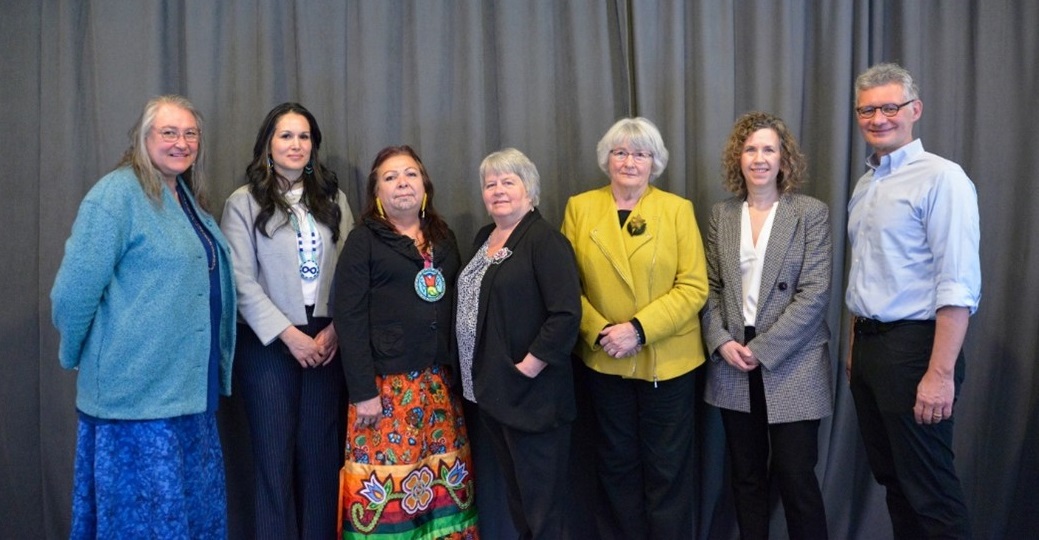Celebrating First Nations, Inuit and Métis cancer care progress in Canada
Sharing outcomes and lessons from six years of action on Peoples-specific, self-determined cancer priorities
July 24, 2023

In March, a group of delegates representing First Nations, Inuit and Métis partner organizations gathered in Toronto to share and learn from each other’s work, and to mark the conclusion of a Partnership-funded initiative to support improved cancer outcomes in First Nations, Inuit and Métis communities.
Improving cancer care and outcomes for and with First Nations, Inuit and Métis peoples in Canada is one of the core priorities of the Canadian Strategy for Cancer Control. Since 2018, the Canadian Partnership Against Cancer (the Partnership) has supported 29 partners across all 13 provinces and territories to take action on Peoples-specific, self-determined priorities.
“For many of the attendees, this was the first time they had attended an event in person since the pandemic,” says Talia Pfefferle, Director of First Nations, Inuit, and Métis Cancer Strategy at the Partnership. “The excitement and energy of the people in the room were palpable. You could sense how much they were looking forward to connecting, reconnecting, sharing their work, and learning new ideas and approaches.”
The meeting began with a traditional prayer from Elder Valerie King of the Mississaugas of the Credit First Nation; she also closed the event the next day. The two-day event featured presentations from partners, as well as statements from First Nations, Inuit and Métis Advisors to the Partnership: Lea Bill, Gail Turner and Susie Hooper. The attendees were also treated to a special throat singing performance by two Inuk singers.
Through the funded initiatives, the Partnership has invested over $24 million and engaged more than 130 Indigenous governments, organizations and community partners. More than 500 communities are expected to benefit from these projects.
Highlights of partner-led initiatives include:
- Developing and implementing the first-ever organized colorectal cancer screening program for all regions in the Northwest Territories.
- Removing barriers to care for Métis people with cancer by offering support such as reimbursement of fuel costs and accommodation, and a healthy food allowance, through the Métis Nation–Saskatchewan Travel Assistance Pilot Program
- The First Nations of Quebec and Labrador Health and Social Services Commission supporting community-led cancer control projects such as the Cancer Info-Kit for First Nations of Quebec.
- The Union of Nova Scotia Mi’kmaq implementing a youth healthy living social media campaign with a focus on smoking cessation and prevention.
- CancerCare Manitoba and an extensive network of Indigenous partners creating a First Nations, Métis and Inuit Community Connector Project to provide support and information to their community members as they move through the cancer system.
- Nunavut establishing smoking cessation and colorectal cancer screening programs.
The impact of these initiatives was immediate and will be long-lasting. The colorectal cancer screening program in the Northwest Territories, for example, dramatically reduced the stage of cancer at which patients, some of whom were from communities with extremely low screening rates, are typically diagnosed.
Since its launch in 2019, the territorial colorectal cancer screening program has offered FIT kits to 3,910 Northwest Territories residents, representing the entire population eligible for screening in six out of the territory’s seven health regions, and a part of the seventh.
Through this project’s success, the Northwest Territories Health and Social Services Authority (NTHSSA) has strengthened relationships with local governments and community members, building community trust in the healthcare system.
Quality improvements include translating screening resources into all 11 official languages (nine Indigenous, French and English) in the Northwest Territories, transitioning to pictograph-based FIT instructions, establishing collaborative working relationships with community health representatives, and revisions to program materials to ensure communication from the program aligns with culturally safe care.
– Catherine Dixon, Territorial Manager, Cancer Care, NTHSSA
The Partnership’s funding helped make cancer care more culturally relevant within First Nations, Inuit and Métis communities, as seen in Métis Nation–Saskatchewan. “With the Partnership’s support, we were able to implement cancer care resources that addressed our communities’ unique needs and concerns,” says Tanya Pruden, Director of Health at Métis Nation–Saskatchewan. “These resources help our community members navigate the healthcare system, understand cancer in a holistic way, and learn how to be a stronger, more informed advocate.”
“Seeing the range and depth of impact the partners have made through these initiatives is incredibly heartening,” says Dr. Craig Earle, CEO of the Partnership. “We are deeply grateful to First Nations, Inuit and Métis partners for sharing their stories and achievements with us. As we close this chapter of our work, we are already deep in collaboration with them, refining current projects and developing new initiatives. There is much work to do in meeting our commitment to reconciliation and I want to thank First Nations, Inuit and Métis partners for including us in their journey to improve cancer outcomes for their communities.”
Learn more: First Nations, Inuit and Métis
